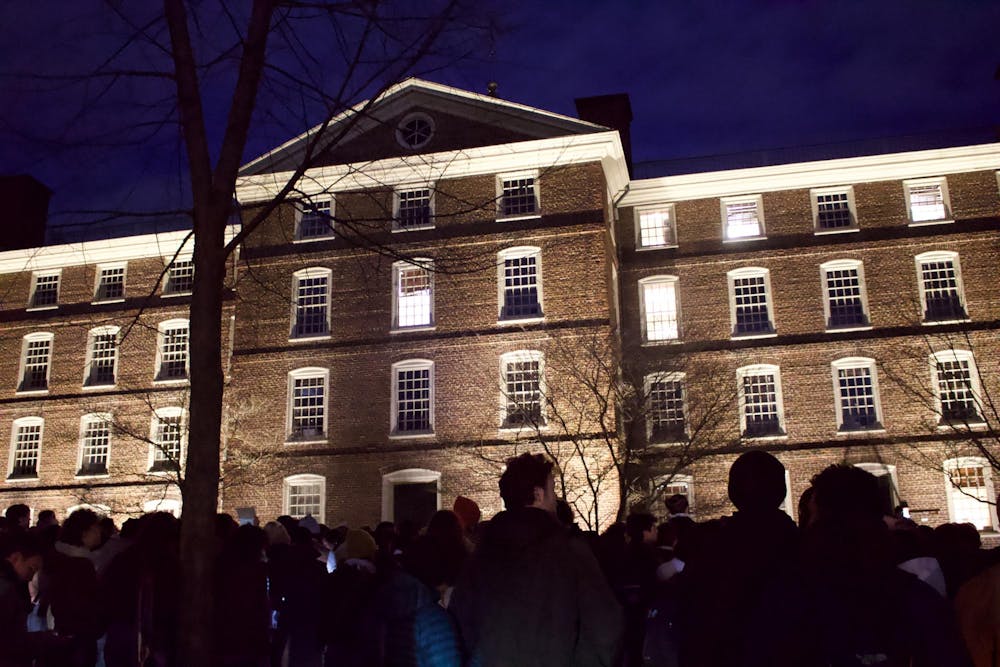Providence Police Department and Brown Department of Public Safety officers arrested and booked all 41 students from Brown Divest Coalition who occupied University Hall this afternoon to demand that President Christina Paxson P’19 P’MD’20 support divestment from “Israeli military occupation” and call for a ceasefire in the Israel-Palestine conflict.
Law enforcement first entered University Hall at 5:17 p.m. The Herald received confirmation from BDC Spokesperson Carla Humphris ’24 that the students were booked inside University Hall under trespassing charges.
“To expedite the process and avoid processing arrests in two locations, Brown DPS arranged with the Providence Police Department to conduct all arrest processing on-site in University Hall,” University Spokesperson Brian Clark wrote in a statement to The Herald. Students were “photographed, fingerprinted and provided their arrest paperwork in lieu of being detained in physical custody.”
“The disruption to secure buildings is not acceptable, and the University is prepared to escalate the level of criminal charges for future incidents of students occupying secure buildings,” Clark added.
The arrests come just over one month after twenty members of Jews for Ceasefire Now were charged with trespassing after staging a University Hall sit-in calling for divestment and a ceasefire. The charges were later dropped following the shooting of Hisham Awartani ’25 and two other Palestinian students in Burlington, Vermont.
“Given that this is the second prominent incident in recent weeks of students trespassing in a secure, non-residential building after operating hours, the University fully expects to recommend more significant criminal misdemeanor charges for any future incidents after the Dec. 11 sit-in,” he added.
According to Clark, students were informed of their arrest at 6 p.m. Starting at 6:40 p.m., law enforcement began releasing students already booked from inside University Hall on alternating sides of the building, according to JFCN and BDC members. The crowd of approximately 400, gathered to support demonstrators, split up to greet protestors with cheers and embraces as they were released.
“It’s essential to highlight that arresting students is not an action that Brown takes lightly, and it’s not something the University ever wants to do,” Clark wrote, adding that The University issued repeated warnings to ensure “that the students fully understood that they would not be allowed to remain in the building after normal operating hours for security reasons, and that they could face disciplinary action for violating policies, as well as arrest.”
Vice President for Campus Life Eric Estes and other staff members informed the occupying protestors of legal consequences, according to a video shared by BDC.
In a 4 p.m. letter to the protestors reviewed by The Herald, Paxson reiterated the University’s safety concerns and potential repercussions for students that decided to remain in the building past operating hours.
Brown’s protest and demonstration policy states that “protest is a necessary and acceptable means of expression,” and that “protests or demonstrations that infringe upon the rights of others … or that interfere with the rights of others to make use of or enjoy the facilities or attend the functions of the University cannot be tolerated.”
While waiting for the arrests to begin, the crowd sang songs of solidarity and worship, including “Where you Go” — a song derived from the Book of Ruth in the Hebrew Bible.
Organizers also led the crowd in Arabic chants — the lyrics of which were distributed via AirDrop to electronic devices in the crowd. Protestors waved their phone flashlights back and forth high in the air.
As the arrests began, students repeatedly shouted “shame on Brown, shame on Brown” and continued their calls for divestment and ceasefire.
The members of BDC originally intended to occupy the building until Paxson publicly supported the findings of the 2020 report by the Advisory Committee on Corporate Responsibility in Investment Policies which recommended Brown divest from “companies which profit from human rights abuses in Palestine.”
In the letter to the protestors, Paxson wrote that she “will not commit now to forward or recommend” the report, citing her previous position that ACCRIP’s recommendation failed to meet established standards for “rigorous analysis” and “identifying specific entities for divestment or… how financial divestment from the entities would address social harm as defined in the committee’s charge.”

Owen Dahlkamp is a section editor overseeing coverage for University News and Science and Research. Hailing from San Diego, CA, he is concentrating in Political Science and Cognitive Neuroscience with an interest in data analytics. In his free time, you can find him making spreadsheets at Dave’s Coffee.

Anisha Kumar is a section editor covering University Hall. She is a junior from Menlo Park, California concentrating in English and Political Science who loves speed-crosswording and rewatching sitcoms.





